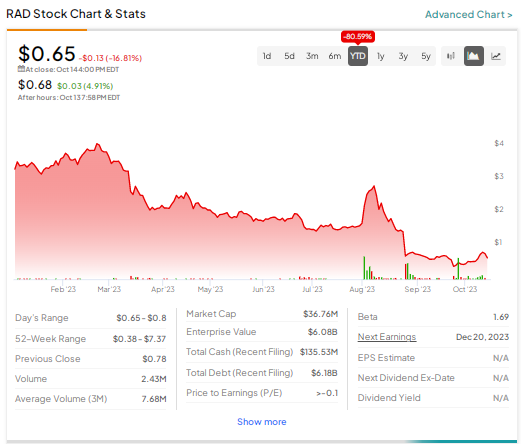Pharmacy chain Rite Aid (NYSE:RAD) filed for Chapter 11 Bankruptcy in New Jersey on Sunday, succumbing to the costs of multiple lawsuits related to the opioid epidemic and other headwinds like lackluster sales and rising debt. The bankruptcy filing will halt these lawsuits. Additionally, the company appointed Jeffrey Stein as its new CEO, chief restructuring officer, and a member of its board of directors. Elizabeth Burr, who served as the interim CEO since January 2023, will remain on the company’s board.
Claim 70% Off TipRanks Premium
- Unlock hedge fund-level data and powerful investing tools for smarter, sharper decisions
- Stay ahead of the market with the latest news and analysis and maximize your portfolio's potential
The company disclosed that it has struck a deal with creditors about a restructuring plan aimed at significantly reducing its debt and improving its financial flexibility. Pursuant to these developments, certain lenders agreed to provide Rite Aid with $3.45 billion in new financing to ensure sufficient liquidity.
Rite Aid Facing Multiple Headwinds
Earlier this year, the U.S. Department of Justice filed a complaint against Rite Aid and its various subsidiaries. The DOJ alleged that the company ignored evidence that pharmacists at its stores were dispensing unlawful prescriptions, thus fueling the opioid crisis by oversupplying painkillers.
Aside from opioid-related litigation, Rite Aid has also been struggling due to weak sales and rising debt. The company’s top line has been under pressure due to lower demand for COVID-19 vaccines and testing, a decline in Rite Aid’s Prescription Drug Plan (PDP) membership, and the loss of commercial clients under the company’s Elixir pharmacy benefits program.
Moreover, drug chains like Rite Aid are facing growing competition from retailers like Amazon (NASDAQ:AMZN) and Walmart (NYSE:WMT). Rite Aid has also been finding it tough to fight competition from larger rivals CVS Health (NYSE:CVS) and Walgreens Boots Alliance (NASDAQ:WBA).
In the fiscal first quarter (ended June 3, 2023), the company’s revenue declined 6% to $5.65 billion, while the GAAP loss per share widened to $5.56 from $2.03 in the prior-year quarter. The company ended Q1 FY24 with a long-term debt of $3.3 billion, up from $2.9 billion at the end of Q4 FY23.
RAD shares have plunged about 81% year-to-date. The stock has a Moderate Sell consensus rating based on a bearish review by Evercore ISI analyst Elizabeth Anderson last week. Anderson lowered her price target on Rite Aid to $0 from $1 and maintained a Sell rating on the shares ahead of the Q3 earnings season for the healthcare tech and distribution group.

















